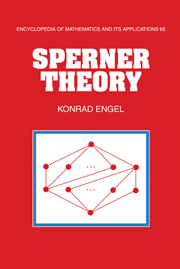Book contents
- Frontmatter
- Contents
- Preface
- 1 Introduction
- 2 Extremal problems for finite sets
- 3 Profile-polytopes for set families
- 4 The flow-theoretic approach in Sperner theory
- 5 Matchings, symmetric chain orders, and the partition lattice
- 6 Algebraic methods in Sperner theory
- 7 Limit theorems and asymptotic estimates
- 8 Macaulay posets
- Notation
- Bibliography
- Index
7 - Limit theorems and asymptotic estimates
Published online by Cambridge University Press: 08 January 2010
- Frontmatter
- Contents
- Preface
- 1 Introduction
- 2 Extremal problems for finite sets
- 3 Profile-polytopes for set families
- 4 The flow-theoretic approach in Sperner theory
- 5 Matchings, symmetric chain orders, and the partition lattice
- 6 Algebraic methods in Sperner theory
- 7 Limit theorems and asymptotic estimates
- 8 Macaulay posets
- Notation
- Bibliography
- Index
Summary
Combinatorial formulas are often quite difficult and one has no idea of the growth of the corresponding functions. Therefore one is interested in asymptotic results where one or several parameters tend to infinity. In particular, this can be helpful in the production of counterexamples to some conjectures. With regard to our general theme we will restrict ourselves to the estimation of the (largest) Whitney numbers (or sums of them) and of antichains and related families in posets. The main idea is the application of corresponding limit theorems from probability theory as well as the use of variants of the saddle point method (cf. Berg [47] and de Bruijn [85]). This chapter lists some important theorems and then describes their application by means of some examples. Omitted are the proofs of those results contained in standard books on probability theory like Feller [178], [179], Rényi [396], and Petrov [382]. Bender's papers [42] and [43] are very helpful for asymptotic enumeration. In this chapter we will also see how the Sperner and the variance problems are related to each other.
Central and local limit theorems
In the following, we will be working mostly with discrete random variables, which are random variables ξ that take on at most countable many (in our cases only a finite number of) values x0, x1, … with probabilities p0, p1,… (P(ξ = xi;) = pi, i = 0, 1, …, and Σ,i pi = 1).
Recall that the distribution function F(x) of ξ is given by F(x) : Σi:xi<x pi.
Information
- Type
- Chapter
- Information
- Sperner Theory , pp. 304 - 331Publisher: Cambridge University PressPrint publication year: 1997
